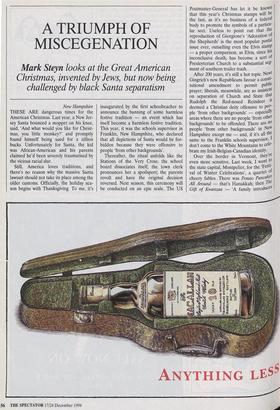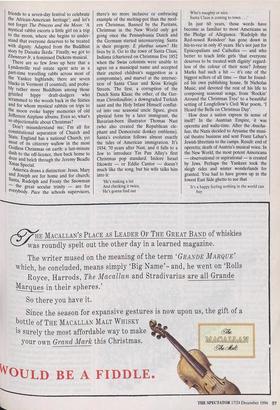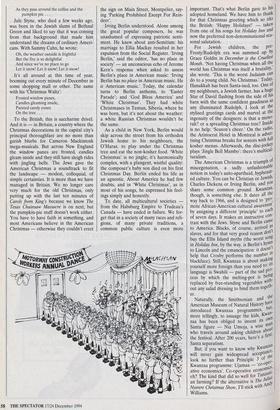A TRIUMPH OF MISCEGENATION
Mark Steyn looks at the Great American
Christmas, invented by Jews, but now being challenged by black Santa separatism
New Hampshire THESE ARE dangerous times for the American Christmas. Last year, a New Jer- sey Santa bounced a moppet on his knee, said, 'And what would you like for Christ- mas, you little monkey?' and promptly found himself being sued for a zillion bucks. Unfortunately for Santa, the kid was African-American and his parents claimed he'd been severely traumatised by the vicious racial slur.
Still, America loves traditions, and there's no reason why the massive Santa lawsuit should not take its place among the older customs. Officially, the holiday sea- son begins with Thanksgiving. To me, it's inaugurated by the first schoolteacher to announce the banning of some harmless festive tradition — an event which has itself become a harmless festive tradition. This year, it was the schools supervisor in Franklin, New Hampshire, who declared that all depictions of Santa would be for- bidden because they were offensive to people 'from other backgrounds'.
Thereafter, the ritual unfolds like the Stations of the Very Cross: the school board dissociates itself; the town clerk pronounces her a spoilsport; the parents revolt and have the original decision reversed. Next season, this ceremony will be conducted on an epic scale. The US
Postmaster-General has let it be known that this year's Christmas stamps will be the last, as it's no business of a federal body to promote the symbols of a particu- lar sect. Useless to point out that the reproduction of Giorgione's 'Adoration of the Shepherds' is the most popular postal issue ever, outselling even the Elvis stamp — a proper comparison, as Elvis, since his inconclusive death, has become a sort of Presleyterian Church to a substantial seg- ment of southern trailer trash.
After 200 years, it's still a hot topic. Newt Gingrich's new Republicans favour a consti- tutional amendment to permit public prayer; liberals, meanwhile, are so insistent on separation of Church and State that Rudolph the Red-nosed Reindeer is deemed a Christian deity offensive to peo- ple 'from other backgrounds' — especially areas where there are no people 'from other backgrounds' to be offended. There are no people 'from other backgrounds' in New Hampshire except me — and, if it's all the same to the Franklin schools supervisor, I don't come to the White Mountains to cele- brate my Irish-Belgian-Canadian identity. Over the border in Vermont, they're even more sensitive. Last week, I went to the state capital, Montpelier, for the 'Festi- val of Winter Celebrations', a quartet of cheery fables. There was Potato Pancakes All Around — that's Hanukkah; then The Gift of Kwanzaa — 'A family introduces friends to a seven-day festival to celebrate the African-American heritage'; and let's not forget The Princess and the Moon: 'A mystical rabbit escorts a little girl on a trip to the moon, where she begins to under- stand that everyone deserves to be treated with dignity. Adapted from the Buddhist story by Daisaku Ikeda.' Finally, we got to Ebeneezer, Jr, a feminised Dickens musical.
There are so few Jews up here that a Lyndonville real estate agent acts as a part-time travelling rabbi across most of the Yankee highlands; there are seven blacks in Vermont (I counted), and proba- bly rather more Buddhists among those grizzled hippy draft-dodgers who scrammed to the woods back in the Sixties and for whom mystical rabbits on trips to the moon evoke happy memories of old Jefferson Airplane albums. Even so, what's so objectionable about Christmas?
Don't misunderstand me; I'm all for constitutional separation of Church and State. England has a national Church, yet most of its citizenry wallow in the most Godless Christmas on earth: a last-minute dash to the off-licence, then back home to doze and belch through the Jeremy Beadle Xmas Special.
America draws a distinction: Jesus, Mary and Joseph are for home and for church; Santa, Rudolph and Frosty the Snowman — the great secular trinity — are for everybody. Pace the schools supervisors, there's no more inclusive or embracing example of the melting-pot than the mod- ern Christmas. Banned by the Puritans, Christmas in the New World only got going once the Pennsylvania Dutch and the Germans started intermarrying. Santa is their progeny. E pluribus unum? He lives by it. Go to the town of Santa Claus, Indiana (chartered on Christmas Eve 1852 when the Swiss colonists were unable to agree on a municipal name and accepted their excited children's suggestion as a compromise), and marvel at the intersec- tion of Santa Claus and Kriss Kringle Streets. The first, a corruption of the Dutch Sinta Klaas; the other, of the Ger- man Christkindlein; a downgraded Turkish saint and the Holy Infant Himself conflat- ed into one seasonal uncle figure, given physical form by a later immigrant, the Bavarian-born illustrator Thomas Nast (who also created the Republican ele- phant and Democratic donkey emblems). Santa's evolution follows almost exactly the tides of American immigration. It's 1934, 70 years after Nast, and it falls to a Jew to introduce Tin Pan Alley's first Christmas pop standard. Isidore Israel Itkowitz — or Eddie Cantor — doesn't much like the song, but his wife talks him into it:
`He's making a list And checking it twice, He's gonna find out Who's naughty or nice.
Santa Claus is coming to town . .
In just 60 years, those words have become as familiar to most Americans as the Pledge of Allegiance. 'Rudolph the Red-nosed Reindeer' has gone down in his-to-ree in only 45 years. He's not just for Episcopalians and Catholics — and who better to teach little girls 'that everyone deserves to be treated with dignity' regard- less of the colour of their nose? Johnny Marks had such a hit — it's one of the biggest sellers of all time — that he found- ed his own publishing house, St Nicholas Music, and devoted the rest of his life to composing seasonal songs, from `Rockin' Around the Christmas Tree' to a beautiful setting of Longfellow's Civil War poem, 'I Heard the Bells on Christmas Day'.
How does a nation express its sense of itself? In the Austrian Empire, it was operetta and waltz-time. After the Anschu- luss, the Nazis decided to Aryanise the musi- cal theatre business and sent Franz Lehar's Jewish librettists to the camps. Result: end of operetta; death of Austria's musical voice. In the New World, the most potent Americana — observational or aspirational — is created by Jews. Perhaps the Yankees took the sleigh rides and winter wonderlands for granted. You had to have grown up in the lowest East Side ghetto to see that
It's a happy feeling nothing in the world can buy As they pass around the coffee and the pumpkin pie .. .
Jule Styne, who died a few weeks ago, was born in the Jewish slums of Bethnal Green and liked to say that it was coming from that background that made him understand the dreams of ordinary Ameri- cans. With Sammy Cahn, he wrote:
Oh, the weather outside is frightful But the fire is so delightful And since we've no place to go Let it snow! Let it snow! Let it snow!
It's all around at this time of year, booming out every minute of December in some shopping mall or other. The same with his 'Christmas Waltz':
Frosted window panes, Candles gleaming inside, Painted candy cones On the tree ...
To the British, this is saccharine drivel. And it is — in Britain, a country where the Christmas decorations in the capital city's principal thoroughfare are no more than garish blurbs for Cameron Mackintosh mega-musicals. But across New England the window panes are frosted, candles gleam inside and they still have sleigh rides with jingling bells. The Jews gave the American Christmas a soundtrack to fit the landscape — modest, colloquial, of simple certainties. It is more than we have managed in Britain. We no longer care very much for the old Christmas, only putting up with the last ten minutes of Carols from King's because we know The Texas Chainsaw Massacre is on next; but the pumpkin-pie stuff doesn't work either. You have to have faith in something, and most Americans believe in the American Christmas — otherwise they couldn't erect the sign on Main Street, Montpelier, say- ing 'Parking Prohibited Except For Rein- deer'.
Irving Berlin understood. Alone among the great popular composers, he was unashamed of expressing patriotic senti- ment. He knew about anti-Semitism: his marriage to Ellia Mackay resulted in her expulsion from the Social Register. 'Irving Berlin,' said the editor, 'has no place in society' — an unconscious echo of Jerome Kern's response when asked to assess Berlin's place in American music: 'Irving Berlin has no place in American music. He is American music.' Today, the calendar turns to Berlin anthems, to 'Easter Parade'; and 'God Bless America' and `White Christmas'. They had white Christmases in Temun, Siberia, where he was born, but it's not about the weather: a white Russian Christmas wouldn't be the same.
As a child in New York, Berlin would skip across the street from his orthodox Jewish home to his neighbours, the O'Haras, to play under the Christmas tree and eat the non-kosher food. 'White Christmas' is no jingle; it's harmonically complex, with a plangent, wistful quality: the composer's baby son died on his first Christmas Day. Berlin ended his life as an agnostic. About America he had few doubts, and in `White Christmas', as in most of his songs, he expressed his feel- ings simply and honestly.
To date, all multicultural societies from the Habsburg Empire to Trudeau's Canada — have ended in failure. We for- get that in a society of many races and reli- gions, of many private traditions, a common public culture is even more important. That's what Berlin gave to his adopted homeland. We have him to thank for that Christmas greeting which so irks the British: 'Happy Holidays!' — taken from one of his songs for Holiday Inn and now the preferred non-denominational sea- sonal salutation.
For Jewish children, the pre- Frosty/Rudolph era was summed up by Grace Goldin in December is the Cruellest Month. 'Not having Christmas when all the world has Christmas was itself a brutality, she wrote. `This is the worst Judaism can do to a young child. No Christmas.' Today. Hanukkah has been Santa-ised, too. One of my neighbours, a Jewish farmer, has a huge Star of David flashing from the side of his barn with the same confident gaudiness as any illuminated Rudolph. I look at the stylised greetings cards and marvel at the ingenuity of the designers: is that a meno- rah? or a spreading Christmas tree? Inside is no help: 'Season's cheer.' On the radio, the Aristocrat Hotel in Montreal is adver- tising Christmas breaks for seniors with full kosher menus. Afterwards, the disc-jockey plays 'Jingle Bell Mambo': there's multicul- turalism. The American Christmas is a triumph of miscegenation, a sadly unfashionable notion in today's auto-apartheid, hyphenat- ed culture. You can be Christian or Jewish, Charles Dickens or Irving Berlin, and ran share some common ground. Kwanzaa, though, is something else. It dates all the way back to 1966, and is designed to TN; mote African-American cultural awareness by assigning a different 'principle' to each of seven days. It makes an instructive eon' trast with the Jews. Styne and Berlin came to America. Blacks, of course, arrived as slaves, and for that very good reason don't buy the Ellis Island myths (the worst song in Holiday Inn, by the way, is Berlin's hymn to Lincoln and the emancipation: it doesn't help that Crosby performs the number in blackface). Still, Kwanzaa is about making yourself more foreign than you need to: its language is Swahili — part of the sad Pro- cess by which the melting-pot is being replaced by free-standing vegetables with- out any salad dressing to bind them togeth- er. Naturally, the Smithsonian and the American Museum of Natural History have introduced Kwanzaa programmes, but' more tellingly, to assuage the kids, Kwan,, zaa has been obliged to invent its ow' Santa figure — Nia Umoja, a wise giant who travels around asking children ab°1! the festival. After 200 years, here's a firs': Santa separatism. But, if you want to know why Kvyan9a will never gain widespread acceptanceh look no further than Principle 3 of „ Kwanzaa programme: Ujamaa
ative economics'. Co-operative economics' eh? The kind that did so well for Tanzan.,1 an farming? If the alternative is The Ma' Nyerere Christmas Show, I'll stick with Andy Williams. to-opeci,












































































































 Previous page
Previous page